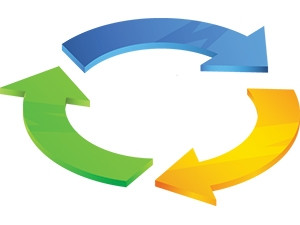
Laser printer manufacturer and enterprise services provider Lexmark has adopted a circular economy after joining the Ellen MacArthur Foundation 'Circular Economy 100'.
The Ellen MacArthur Foundation's Circular Economy 100 is a global platform that brings together innovative businesses to address the issues around the transition to the circular economy model.
The circular economy is a generic term for an industrial economy that is, by design or intention, restorative and in which material flows are of two types - biological nutrients, designed to re-enter the biosphere safely, and technical nutrients, which are designed to circulate at high quality without entering the biosphere.
Other global tech companies in the Ellen MacArthur Foundation programme include HP, Vodafone, Schneider Electric, Ricoh, Cisco, BT and Orange, among others.
"Working with the Ellen MacArthur Foundation and being part of a group of 100 like-minded businesses that are all seeking to promote the obvious benefits of the circularity will help to maintain and improve our own approach to how we incorporate circular economy practices throughout our business," says Sylvie Thomas, head of corporate social responsibility at Lexmark EMEA.
Locally, Lexmark SA has incentivised its customers to engage in sustainable business practice as part of its Cartridge Recycling Initiative for Babies (Crib), with a donation made to the Cotlands children's charity for every cartridge returned. In 2014, the company raised R372 000 for Cotlands.
Lexmark SA's total contribution has been R5.9 million since the inception of the Crib initiative 12 years ago, with more than 230 tonnes of empty cartridges having been kept out of SA's landfills, the company says.
Alex Lemille, CEO of Wizeimpact, says circular economy is a breakthrough concept as it shifts consumption patterns towards a more responsible society while keeping the desire for product performance alike.
"In a circular economy, products are designed for ease of reuse, disassembly, and refurbishment with the understanding that it is the reuse of the vast amount of material reclaimed from end-of-life products - rather than the extraction of resources - that is the foundation of the economic growth," he says.
According to Lemille, the benefits of the circular economy include a reduction of greenhouse gas emission and huge job creation in the low-to-medium-skills South African market given that this model relies on repairing, maintaining, refurbishing the current material stocks through clever marketing concepts.
Corporate responsibility and sustainable business practice are critical to the planet as the world aims to reduce resources and fossil energy in the manufacturing process, says Lexmark. It adds there is a global initiative taking place which urges businesses to move towards the circular economy.
Research by the Ellen MacArthur Foundation estimates the cost savings in materials of adopting a more restorative approach at over $1 trillion a year by 2025.
The shift to circular economic activity could help address the global job gap of 600 million that the International Trade Union Confederation forecasts by 2030 if business continues as usual.
Share